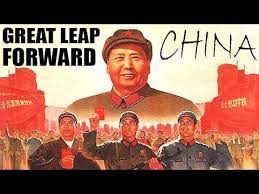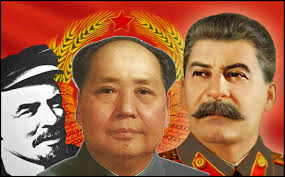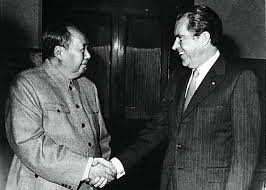A contribution to the 70th anniversary of state capitalism in China

“The Great leap Forward” took place between 1958 and 1961. Recently leaked internal minutes from a discussion of a speech delivered by Xi Jinping to the Central Party School in 2010, prior to his ascendency to PRC President and CCP General Secretary reveal the following about the Great Leap Forwards:
” …the difficult period from 1959-61, if you officially told the commoners that our Party was in control during this period we’d be responsible for the starvation of 38 million and countless of villages, how dreadful! Even more Chinese people than the Japanese killed, even more efficiently, easily, and without losing soldiers. If the common people learned this truth they would rebel against us. Therefore, we say that Party history has a bottom line, and that crossing this line is a break of the rules and must be punished. This is the meaning of Comrade Xi Jinping’s address. ” – from here
So 38 million people were starved to death or killed. And yet Mao is hailed as a revolutionary hero to many (including the students who support the Jasic workers’ struggles).
The man in charge of agriculture at that time was Tan Zhenlin, who in 1958 said, “Communisation is the communist revolution”. What he meant was collectivisation – forcing the peasantry into communes: The People’s Communisation Movement. http://mt.china-papers.com/2/?p=207808 . The Peitaiho Resolution of 1958 called for “communisation”. Chapter 6 of “Eating Bitterness: New Perspectives on China’s Great Leap Forward and Famine” is called “An Introduction to the ABCs of Communization: A Case Study of Macheng County”. At this time there were expressions such as “the spirit of communisation” and “the wind of communisation”. The “wind of communisation” seems more appropriate, as it’s all wind, but sadly, an ill wind that blows nobody good.
Theoretically, communisation meant forcing the merging of small collectives into huge communes, involving the immediate breaking down of the separation between production units, the abolition of property, wages and individual land patches. In practice this meant squads of Communist Party cadres went round smashing up peasant cottages, burning down villages, confiscating all peasant tools and cooking utensils. Peasants were forced into collective slave labour camps. Any independent means to collect, store or even prepare food was taken away and the cadres imposed a monopoly of food supply in the communal dining halls, used as a weapon of social control. Those who didn’t co-operate were deliberately starved to death. In Henan, for instance, from the winter of 1959 to the spring of 1960, at least one million people starved to death – 12.5% of the population.
Dikotter writes in “Mao’s Great Famine” (Bloomsbury, London, 2010): “…Tan Zhenlin, in charge of agriculture, toured the provinces to galvanise the local leadership. He shared Mao’s vision of a communist cornucopia in which farmers dined on delicacies like swallows’ nests , wore silk, satin and furs and lived in skyscrapers with piped water and television. Every county would have an airport. Tan even explained how China had managed to leave the Soveit Union in the dust: “Some comrades will wonder how we manage to be so fast, since the Soviet Union is still practising socialism instead of communism. The difference is that we have a “continuous revolution”. The Soviet Union doesn’t have one, or follows it loosely…Communisation is the communist revolution!”. In fact, the function of this brutal primitive capital accumulation was to force the peasantry into proletarianisation, working on industrial projects or in factories merely to avoid starvation. In this way, over a far shorter period of time from that of the enclosures to the 19th century industries of Victorian England, China was able to develop a modern economy so as to eventually compete on the world market and to sustain the class privileges of the Communist Party.

The great anti-imperialist Mao meets Nixon during the Vietnam war and the bombing of Cambodia
As for Mao’s poetry, Simon Leys wrote this about it: “Let us have no illusions about the quality of Mao’s artistic creation. The fame of his poetry owes everything to his fame as a politician; if Mao had not played his particular part in history, his poetical works, which are slight and often clumsy, would not have stood out from the work of thousands of other amateur poets who flourish in each generation of Chinese scolars. Certainly the poet’s inspiration meets the politician’s experience to commanding effect in the poem “Snow” (to the tune of Ch’in yuan ch’un) which is memorable in the same sense as “Song of the Great Wind” by Lui Pang, the founder of the Han dynasty, or the poems of the military leader and statesman Ts’ao Ts’ao (even if, as gossip has it, Mao’s poem was corrected and reshaped by Liu Ya-Tzu). But this single example apart, it is not difficult to agree with Arthur Waley’s criticism, which used a pictorial comparison and rated Mao’s poetry “not as bad as Hitler’s painting but not as good as Churchill’s”. (Simon Leys, The Chairman’s New Clothes – Mao and the Cultural Revolution; Allison & Busby, UK 1981). See also this by Simon Leys.
Further reading:
China’s Economic Reforms by Lin Wei and Arnold Chao (University of Pennsylvania Press, 1982)
Village China Under Socialism and Reform: a micro-history 1948-2008 by Huaiyin Li
Tombstone: The Great Chinese Famine, 1958-1962 by Yan Jisheng (Farrar, Strauss and Giroux
Mao’s Crusade: Politics and Policy Implementation in China’s Great Leap Forward by Alfred L.Chan (OUP, New York, 2001) (for “communisation”, check out especially pages 68-82)
The Chinese Communes by E.Zurcher (1962)
And this, about the Chinese so-called “Communist” Party in 1942, is worth looking at.
My thanks to X for all this information and much of the content of this.
Most of this is taken from the comments box here.
Leave a Reply